[ad_1]
Excerpts:
Your wife Victoria beat you to it, coming to India…
She did, I know, I know. When I told her I was coming here, she was like, ‘Oh, I went a long time ago’. I asked, ‘It was a long time ago. Are you sure you can remember?’ But she remembers. She said the people were so welcoming. When she was here, people were crazy for the Spice Girls. From the moment I arrived it’s been unbelievable. India’s been one of those places where I’m going to look back and think, that was just an amazing experience.
Are you coming back soon then?
I’m planning on coming back early next year. If I didn’t have to work, I would have loved to stay for the World Cup final because going to the cricket (India vs New Zealand semifinal) was just one of the most amazing experiences.
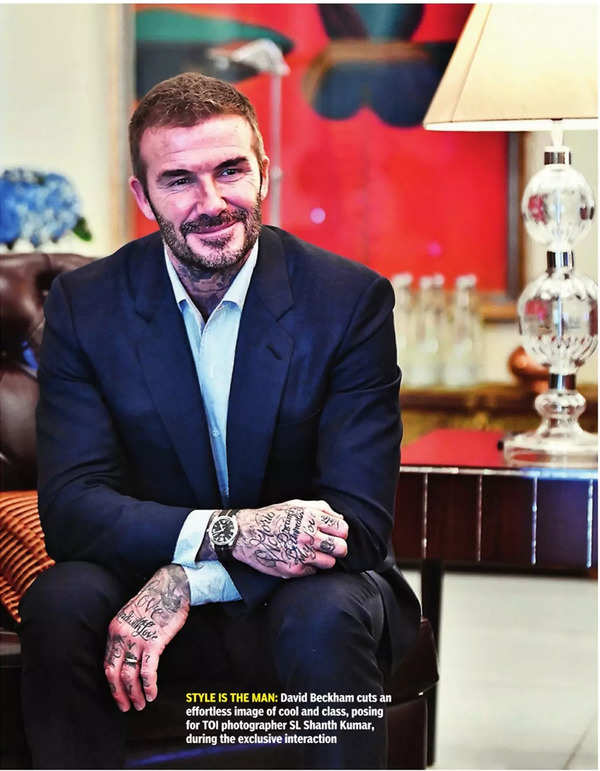
Can you tell us what you shared with Sachin Tendulkar and Virat Kohli?
Just sitting with Sachin was special. I’ve met him before at Wimbledon in the royal box. He’s just a kind human being, that’s what I love about him. He’s broken every record, people love him here, but he’s so humble. It was special sitting next to him in such a historical game. And then, to walk on to the field was very special, meet some of the players on such a big day.
I was hoping I would meet Virat and then in my sportsman’s head, I was thinking, ‘Okay, I shook his hand. I wished him luck. I really hope he has a good game, and I really hope they win. Because if he doesn’t, I’m the person that brought the bad luck.’
After the game, someone said ‘you’re the reason he did this (score his 50th ODI hundred)’. But I was like, ‘I am not the reason why that happened.’ But it was such an historical moment for him.
I arrived in India on Diwali, I was here for ‘New Year’ and I was still here for my first cricket World Cup. Perfect timing.
People have been posting that you were the lucky charm…
Thank goodness, I can come back now (Laughs).
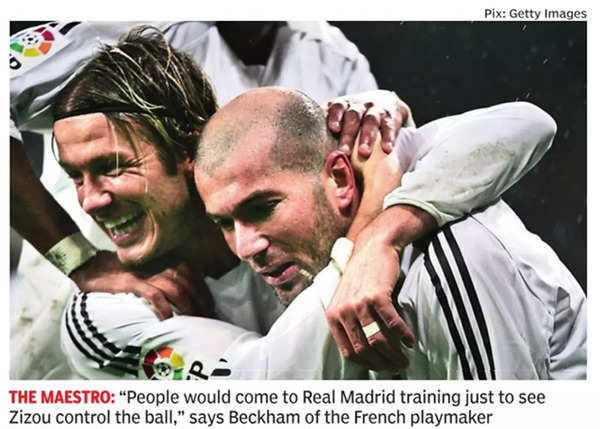
You promote gender equality, there’s Bend it like Beckham, the film about a girl of Indian origin idolising you and wanting to playing football, you have a tattoo of your wife’s name in Hindi. So, there’s been this connection with India…
Hearing from Victoria, it was always a place that I wanted to visit. First, because I have many fans here. Also, I love Indian food. I was so excited. One of my favourite restaurants in London is an Indian restaurant called Gymkhana. And there’s another called Trishna. There’s a Trishna here, but it’s different. Visiting the country was important to me.
Gender equality is something that I have always believed in. What we have seen in the last five years with women’s football has been incredible. I remember going to women’s games and there being 1000 fans in the stadium. In the Euro final, we had 78,000 fans at Wembley. And to see our girls win, that really connected with the fans. Every game in the league now, the stadiums are sold out. I also lived in America when the women’s game was at the peak. So, I have seen the levels they can go to.
They have inspired a new generation. My daughter Harper is 12 years old. She was asking me to take her to games, get her shirts, and then the girls from the England squad sent her a couple of T-shirts.
You’ve said that Harper’s the boss of the family…
She has full control of me. Her mum is a lot stricter than I am. I said ‘No’ to her once and never again because when I said ‘No’ once, she pushed her lower lip out (imitates a teary pout), so never again. But luckily, she’s a good girl. She’s the boss because she has me wrapped around her finger.
Talking football, who is the best you played with, and against?
Even though I played with greats like (Eric) Cantona, or Bryan Robson, who was my hero, Roy Keane and Figo, Zizou for me is the ultimate. The toughest player I have played against was Roberto Carlos. When I used to play against him, he’d kick me hard, but he was the first one to stand over me and smile and pick me up, and he became one of my closest friends.
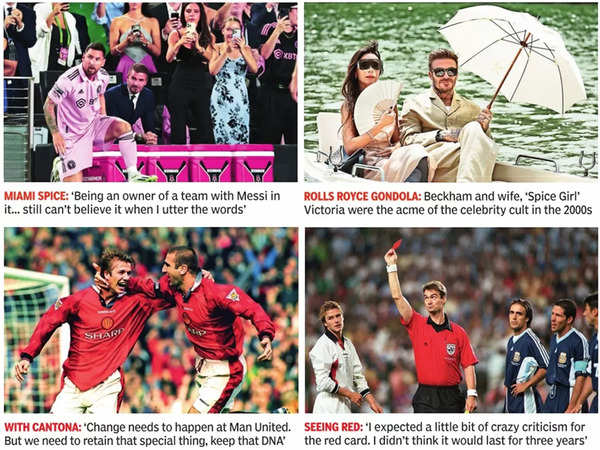
How has it been from playing, training with Zidane, captaining Rooney to now, being Messi’s boss?
It’s incredible being able to play with a player like Zizou. It was a dream come true. When I moved to Real Madrid, we had a great team. Ronaldo, Figo, Roberto Carlos, all great players, but Zizou was a player that I always admired, when I used to play against him and when I was playing with him.
One of the best moments for me was when he was playing his last game. On the Friday before the game, he came and sat next to me in the locker room. It was just us and he said, ‘Thank you for an amazing three years. Thank you for the experience.’ For me, that was the best thing. People would come to training just to watch him control the ball.
Captaining Wayne Rooney… He was such a great talent as a player. He came into the England squad at 16 years and he was already like a man. He was built strong, played like he’d been in the league and playing the game for 10-15 years. And he was such a talent. I always tried to be there for him for advice, always talk to him about anything that he needed to talk about. And he ended up breaking many records, for England and Man United.
And then being an owner of a team with Lionel Messi in it… I still can’t believe it when the words come out of my mouth. I can’t believe that we have Leo in our team in Miami. It came with a lot of determination, a lot of perseverance. We had to work very hard to get him. But we knew that we had an opportunity, we knew he wanted to live in Miami. We knew that he was going to leave Paris (Saint Germain). That was our opportunity. We had competition from Barcelona and Saudi league, but we knew that he really wanted to come to Miami. It was just a case of making him believe in the team and the league. We also knew that it would be a game changer. You bring someone like that into your team, into America, and we always talk about this as owners, (that) it wasn’t just a gift for our fans and our team. It was a gift for the league and for America because what he has done from being on the pitch, and off the pitch, has been incredible for the league. The world’s eyes are on MLS every single game now. All three of these things are incredible.
Why did the Galacticos that you were part of, not win big despite the talent?
There’s always that tipping point in great teams. They had just won La Liga and then won the Champions League the year before. They’d had the same manager Vicente Del Bosque for a long time and there was stability, that had the same precedent. When you have stability running through a club, you have success. When you don’t have stability, there are problems. The four years I was there, we had five coaches, five managers, two different presidents. It was one of the reasons why I left Real Madrid because a new president came in and he didn’t feel the same as Florentino (Perez), so things changed. You see that at Manchester United now, after Alex Ferguson left. And we were all getting a little bit older as well. But I was very happy to leave Real Madrid in the end with a La Liga title. If I had left Real Madrid without winning something, it would have been something that I would have regretted.
Manchester United are similarly going through their difficult moments now…
I’ve been very outspoken about the problems that we have at Manchester United. United is a place that is in my heart, I’ve supported Manchester United for as long as I can remember. My father was a Manchester United fan. I just want us to get back to the top. I don’t care how we do it, yet I do care how we do it. We should do it in the right way. It’s time to change things, the last 10-15 years have not been the Manchester United style. We have won the odd trophy here and there, but that’s not Manchester United. Change needs to happen soon.
When you look at what Man City have built, they’ve built for the next 50-100 years. And that’s important. That’s what United always had. We always had a good academy system. Every player used to want to come to Manchester United. We don’t have that anymore. We need to update a lot of things from training facility to the stadium, but of course retaining that special thing we have in that stadium.
I walked into Old Trafford the other day, and I get goosebumps because of the history, the heritage. Whatever ownership group comes into taking over at Manchester United, they need to keep that DNA because the fans won’t be happy if that goes.
Who’s a natural – Beckham the footballer or Beckham the businessman?
To be honest, I’ve been preparing for the business side for a long time. I’ve obviously been a football player for 20-22 years professionally, and I was lucky that my career lasted as long as it did. I started my first professional game when I was 17, and played my last one when I was 38 years old. Throughout that time, I was also preparing for the time I would finish. I wanted to go on and do something else. The moment I finished my last game in Paris, I jumped on a plane and flew to Miami and announced the team.
I still miss football every single day. Going into the stadium for the cricket match, I had that feeling I want to play again. I’ll always have that feeling.
I knew I needed to be busy. But the business side I love. I have a great team around me. It’s all about the foundation that we’ve built. It’s not just happened overnight. My business has been around for over 20 years. We’ve had partnerships for easily over a couple of decades. It hasn’t happened overnight. I am not sure what I enjoy most, but football is what I miss.
Cricket in India is huge, of course, but football is another story. If you have any advice to give…
I think the most important thing is that you have the foundation, an academy, a grassroots game. I started playing football at five, six years old in a Sunday League team. It was like an academy team. You need to have these foundations for young children… not have to pay to go and play but go and play and enjoy.
Today. every MLS team has an academy system. Six players have come through our academy, and now playing in the full MLS team.
When India has this kind of setup, that’s when India will create that success. Also, hosting an Olympics or a World Cup, are important for countries because it really does change things. It gets people talking about it and celebrate and showcase what their country is all about. It’s an important part, but it starts with the foundation.

The red card at the 1998 World Cup to the redemption with the free-kick goal against Greece? How cathartic has that journey been?
(Deep breath) Ah, it was a long emotional journey. When I got the red card, I expected a little bit of crazy criticism. I didn’t think it would last for three years and to the extent that it did. But now I look back on it, I think that was the challenge for me in my career. That was someone turning around, and saying ‘Okay, how tough are you? How are you going to get over this?’ The only way I knew of getting over that, was putting my head down, working harder. I was lucky I was at a club like Manchester United and had a manager like Sir Alex who protected me, and the fans. It was the manager, my teammates, the fans and my family that got me through that difficult moment. So then, fast forward to scoring that goal as England captain at Old Trafford, that takes us through to the (2002) World Cup. That changed everything (snaps his fingers).
I think it was that moment because even when I was given the captain’s armband, people still held it against me, but as soon as I scored a goal like that, suddenly, it went away overnight. Telling the story about that in my (Netflix) documentary was very difficult, that period of time because it wasn’t just what I went through. I knew that I was strong enough to handle it, I knew I was protected whereas my family wasn’t. My parents, my family, that’s one thing I can never take back. The fact that they had to go through that difficult time with me. I can’t take that back. But the one thing that I can do is try to make up for it and, scoring the goal that I did, made up for that.
Everything changed, thankfully.
David, in a pop cultural sense, you are perceived as the first celebrity icon in the UK after Princess Diana, and yet being from the working class, you took to it effortlessly. What sacrifices does one make for such celebrity hood?
It’s difficult to deal with because I did come from a working-class background and so did Victoria. Even though I made the (Rolls Royce) joke about it in the documentary, she comes from a hardworking family too. The good thing was we had each other. She was a Spice Girl, I was playing for Manchester United and England. We were together on it. We had good people around us. We have got long-term friends. And we always surrounded ourselves with the right people. That was the way we got through it. It wasn’t easy at times because you have the spotlight on you. But the good times we enjoyed, and the bad times we just put our heads down and stuck together.
At the end of the day, we had young children and your priorities change. The fact we had children early helped us to fight our way through certain situations. Because you do anything to protect them. And that was our way of getting through those tough, tough moments.
Your children get noticed, and people want pictures with them. I have never complained about the situation that my wife and I are in because we know we were very privileged. We have worked hard, of course, but we have worked hard for our families and our children. And our children understand.
Our children are humble and kind and treat everybody the same. If we have been able to do that, our job is done. At the end of the day, children should be allowed to make mistakes. You have just got to help them through those moments when they listen, because we know children they don’t always listen. But we are very lucky with our kids.
‘In my travels, I always noticed that the girls get left behind. I want to help break this barrier’
As a Unicef Global Goodwill Ambassador, David Beckham visited India for the first time to see the projects the organization is supporting for children. In 2015, Beckham launched the 7 Fund for UNICEF, “aiming at helping children around the world – especially girls – break down barriers.”
David, you’ve been with Unicef since 2005. Can you tell us about your experience as a global ambassador?
It started in Thailand. We were touring with Manchester United, and someone came into the hotel and asked, ‘Would anyone like to visit a women’s centre for Unicef?’ I put my hand up and said, ‘Yes, me.’ And I enjoyed it so much. Then, I approached Unicef and said I would love to play a bigger role. I got the call from Kofi Annan (former UN secretary general) asking me to be a global ambassador. Since then, I’ve done a lot of field trips from Sierra Leone to the Philippines. My role is purely focused on children.
Over my time of travelling, the one thing I’ve always noticed is that girls get left behind, they don’t have the same opportunities as boys. So, we approached Unicef about doing a separate fund for focusing on girls. And we’ve been doing that for a few years now.
Please tell us about your takeaway from the field visits in India, your interaction with the children and the families?
It’s been an incredible experience going to different places, seeing different families, different villages, different children, mainly young girls and hearing their stories really encouraged me. Unicef has done some incredible work so far, protecting these young girls from early marriage, and missing out on their education.
I met two different families in Gujarat. Both had grandparents that had taken in these young children because they’d been orphaned. When I sat with the first family, with two boys and two girls, I asked the girls what do they wanted to be? The two girls said they wanted to be teachers. The two boys wanted to be policemen. I told one of the little boys, ‘Have you seen the police car that was with us?’ And he said, ‘I saw the light’. Later, I took the boys to the police car, they sat inside, and their faces lit up. Another family I went to, had four girls. I asked the girls, ‘What do you want in your future?’ And the grandfather replied, ‘I’ll answer that’. He was late 50s, a different generation so I was wondering. He said, ‘Their future is what they decide their future is, they will finish school and then it’s down to them’. And that made me realize that there’s something good that’s happening in this organization.
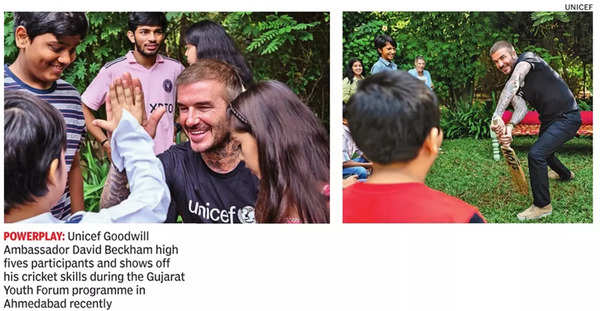
We saw a video of you playing cricket with the kids…
I used to play cricket when I was at school. And I must admit, when the kids asked me to play cricket (in Ahmedabad), I was a bit nervous. But they seemed to be impressed. I used to be a batsman. And I like being around children when they’re playing sports, it takes them away from some of the difficulties that they are going through in life. Sport is such a powerful tool to change children’s lives.
[ad_2]
Source link





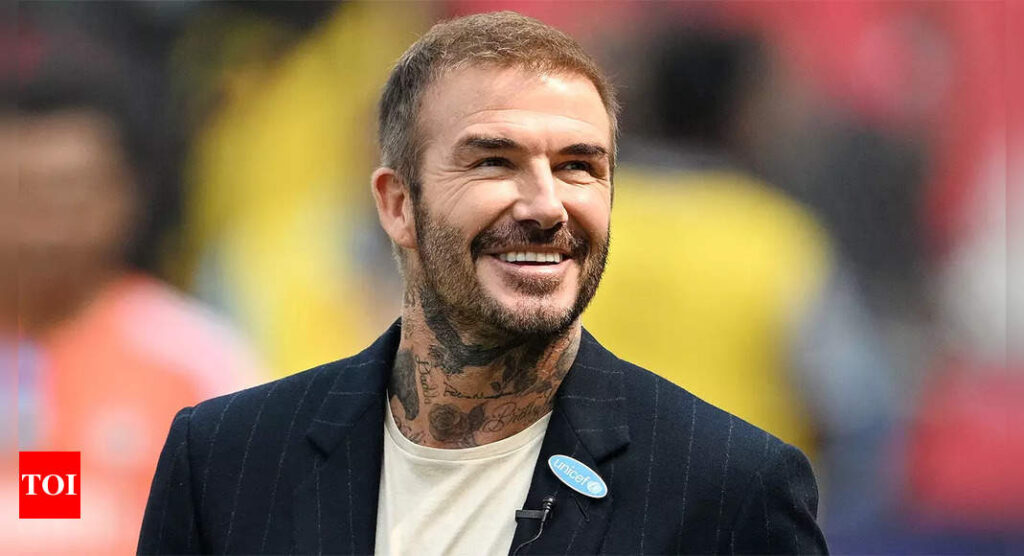




More Stories
Australia exposed India’s little chinks in World Cup final: Sanjay Manjrekar | Cricket News
Rahul Dravid, BCCI engage in discussion but board inclined towards new coach | Cricket News
IPL 2024: Delhi Capitals retain Prithvi Shaw | Cricket News